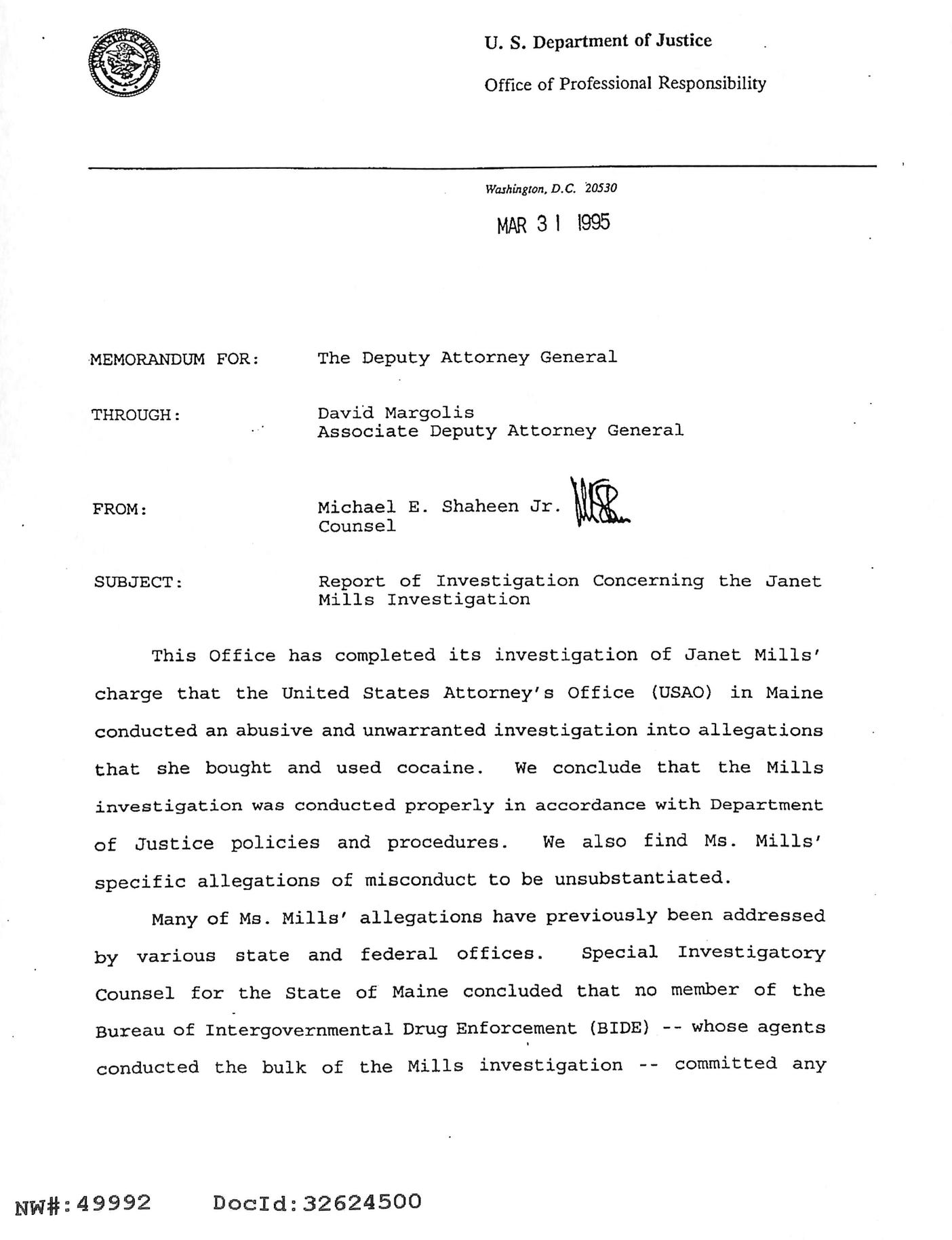Newly Surfaced DOJ Docs Discredit Janet Mills' Claims About Cocaine Investigation
The newly discovered documents contradict the governor's longstanding claims that an investigation into her cocaine use was politically motivated and baseless.
Thirty-seven year-old allegations of cocaine abuse have returned to haunt Maine Gov. Janet Mills thanks to a resurfaced U.S. Department of Justice memo that details the probe into her alleged drug use when she was a district attorney.
The DOJ documents, unearthed by Fox News on Friday, revive longstanding allegations that Mills had a substance abuse problem even as she was putting other Mainers behind bars for selling narcotics or driving under the influence.
The 1995 DOJ memo, penned by the Office of Professional Responsibility (OPR), torches Mills’ allegation at the time that state drug investigation and subsequent federal probe into her alleged drug use was a politically charged hit job, declaring the investigation “proper” and her accusations “unsubstantiated.”
Beginning in 1988, Mills was the subject of an cocaine investigation that culminated in a grand jury investigation revolving around her alleged personal use, purchase, and possession of cocaine.
When Mills learned of the investigation, which began with the now-disbanded Bureau of Intergovernmental Drug Enforcement (BIDE), she rabidly attacked the investigators and the investigation itself, claiming it was a political witch hunt aimed at sliming her and her politically connected father.
“It’s scary, Maine apparently has a secret police force at work that can ruin the reputation of any who opposes it,” Mills fumed to the Portland Press Herald in 1991, painting BIDE as a rogue outfit.
The DOJ memo, however, pours cold water on her sob story. The investigation, led by U.S. Attorney Richard Cohen and overseen by DOJ bigwigs in D.C., was “conducted properly in accordance with Department of Justice policies and procedures,” the OPR declared.
Multiple witnesses, including shady drug dealers, pointed fingers at Mills, but the feds played it straight, tossing out dodgy claims since “some had been prosecuted by her office for drug offenses” or were angling to dodge their own rap sheets. No indictment ever dropped, but the OPR insists there was “sufficient evidence” to justify the probe.
“The USAO in Maine conducted a proper investigation of serious allegations; no misconduct of any kind can fairly be attributed to any member of that office,” the memo states.
“The USAO acted responsibly and conscientiously by scrutinizing all of the allegations,” the memo states.
Mills’ gripes didn’t stop at politics. She accused investigators of strong-arming witnesses, like convicted coke dealer Michael Morris, whom she claimed got slammed with harsh penalties for not ratting her out. The memo debunks that, revealing Morris lied about Mills to save his house from forfeiture and got caught. Mills also whined that feds didn’t quiz her family to clear her name but then flipped, complaining when they did talk to her office staff—a contradiction the OPR called “not well taken.”
Then there’s the grand jury leak that set Mills off. A December 1990 WCSH-TV report spilled the beans on the probe, and Mills screamed that BIDE agents were behind it, demanding the feds investigate. The OPR found zip to back her up, noting the reporter, John Impemba, clammed up about his sources. “There is also no evidence that any member of the USAO leaked information,” the memo states, shutting down Mills’ conspiracy theory.
Mills even took swings at Assistant U.S. Attorney Jonathan Toof, accusing him of harassing witnesses like attorneys William Cote and J. Peter Thompson to squeeze out false testimony. She claimed Toof bragged about nabbing an indictment to scare up more dirt, but the OPR couldn’t find the lawyer who supposedly heard it, and Toof denied it flat-out. “All of the questioning of Cote was handled professionally and correctly,” the memo snaps, calling Mills’ allegations a bust.
Fast-forward to 2025, and Mills, now 77 and in her final term as governor, is still playing the victim card, recently accusing President Trump of targeting her over her stance on biological males in women’s sports. But with Maine drowning in a drug epidemic—fentanyl and meth are ravaging the state—her old cocaine saga raises eyebrows. The DOJ memo, written under Bill Clinton’s watch with Merrick Garland as a deputy, makes it clear: Mills’ “witch hunt” claims were bunk.
“No misconduct of any kind can fairly be attributed to any member of that office,” the OPR ruled.
Maine Wildlife Chief on Covering Up Dark Web Drug Scandal Involving Ex-Husband: "can’t talk about personnel..."
During Saturday's annual moose hunt lottery, Inland Fisheries and Wildlife Commissioner Judith Camuso accidentally confirmed that a former IF&W supervisor used a state-issued device to purchase drugs on the dark web, an illegal act that went unprosecuted partly because state officials chose to conceal the incident.







